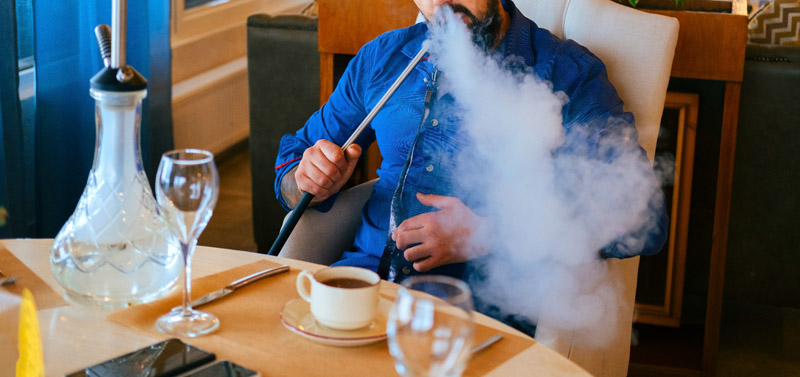By Ben Garcia
After a ban of more than a year due to the coronavirus pandemic, shisha cafes can reopen and welcome customers. Some health precautions are still in place, of course, but the popular pastime is finally back. This is good news for shisha smokers, many of whom have gone months and months without visiting their favorite cafes. But for shisha café owners, the good times aren't back yet.
Before the pandemic, there were hundreds of dedicated shisha cafes in Kuwait and hundreds more restaurants that served shisha along with food. But shisha places that have been closed for months have lost staff, who've either left the country or found other jobs. The shisha cafes have lost so much business that many may stay closed permanently.
"Other shisha houses have reopened but in my case I am still searching for new people to work with me so we can reopen," said Abu Ahmad, an Egyptian entrepreneur who did not want his café or full name to be mentioned. "I allowed many of my workers to work somewhere else during the pandemic. Now we cannot easily pull them out from their new companies where they are currently working. It's a challenge to recruit new people now. We also cannot hire new workers from abroad. Workers in Kuwait are getting fewer and fewer as no additional recruits are added to the workforce," Abu Ahmad said.
Apart from manpower shortages, there are more pressing concerns on the back of 17 months of closure. "Do you think property owners will easily allow us to reopen without payment for their property rentals? They won't allow us to reopen until we pay the rent due. As for me, I didn't pay rent for only five months. The rest of the months I paid because I was anticipating reopening way back in March or April of this year. But there are shisha cafes I know of that haven't paid anything, and the shops are empty and closed. They want us to pay the past dues. Non-payment would mean no reopening," Abu Ahmad said.
Shisha providers are required to sterilize the waterpipe before and after each individual use and serve it along with a disposable smoking hose. Even as they open, they are also required to observe social distancing and a capacity limit of not more than 50 percent of the venue. In May, the government agreed to the reopening of cafes and restaurants in the country as part of a plan for a gradual return to normal life, but kept a ban on shisha imposed since March 2020.
Yolly, a Filipina shisha server, is happy to be back at her old job, since it means a return to full-time employment. "My boss told me to come back. Since I was just a part-timer in my job since last year as a cleaner, I am happy to be working again at my old job," she said. "My boss is very understanding; he allowed me to work from July last year as a part-timer.
My visa was not cancelled and I was earning the same money I earned at the shisha cafe. From March 2020 until July 2020, my boss paid my salary regularly. But towards the end of July, he told me to look for a part-time job. So I searched and got a cleaning job. Now my boss has told me to prepare the café because we are opening on Thursday (yesterday)," she said.
Earlier, the Kuwaiti Union of Shisha Cafés welcomed the decision of the health authorities to allow the reopening of shisha cafes. The union promised to use disposable hoses and ensure all workers adhere to wearing masks and gloves, serve drinks in disposable paper and plastic cups and wash and sterilize the shisha after every use.
Shisha is a widely popular activity among Kuwait youth, with more than 57 percent of adult males participating in shisha smoking at least occasionally. Shisha (also referred to as hookah, waterpipe or hubbly-bubbly) is a traditional method of smoking in the Middle East and the Indian subcontinent.
.jpg)

